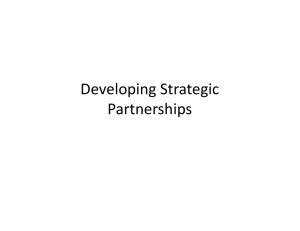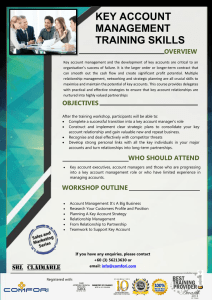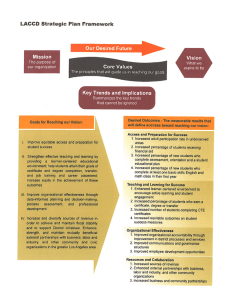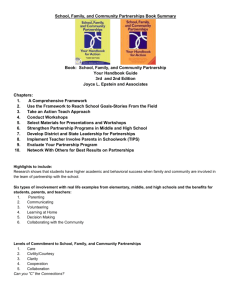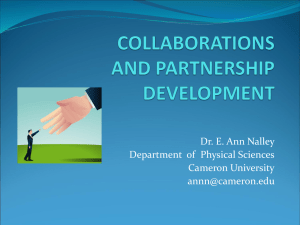Kathi Schoonover Director of Research & Sponsored Programs Northeastern State University
advertisement
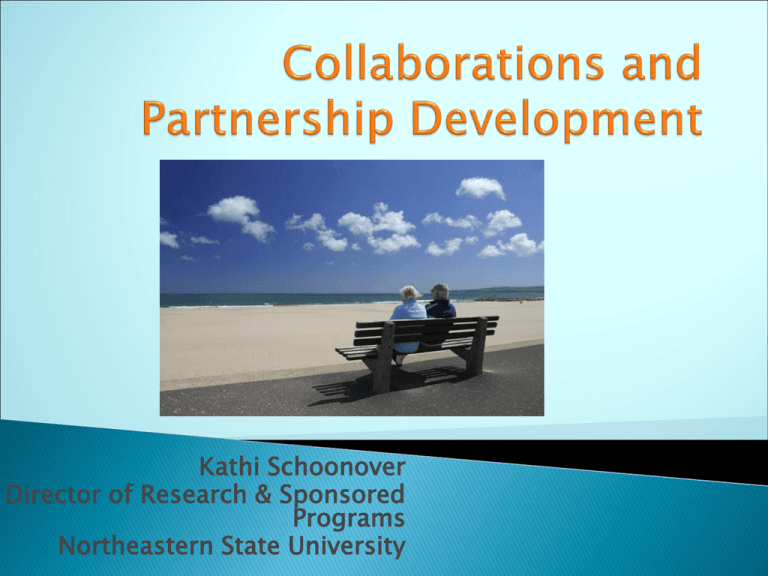
Kathi Schoonover Director of Research & Sponsored Programs Northeastern State University An association or a combination, as of persons, organizations or institutions, for the purpose of engaging in a joint venture. Resource: National College Access Network (NCAN) www.CollegeAccess.org Work together on a common enterprise or project; "The soprano and the pianist did not get together very well"; Win-win: for partners and for funding agency To bring multidisciplinary groups together under a central theme. The multidisciplinary groups may be different academic units within a college, different colleges within an institution or different institutions. To establish a cohesive group that allows individual units or individual partners to contribute to the principal theme Each member of the collaboration or partnership must have an interest in the theme with documented expertise. The leader may be self-selected, appointed or elected. The leader must be willing to listen, involve the partners and provide leadership in the administration of the collaboration or partnership. What is the target area we will serve? ◦ Seek out collaborate partners ◦ Make sure you include representatives from all boundaries of the target area. People who are oriented toward implementation. People who hold a position of influence in the target area such that others will follow. People with a “can do” attitude. People with resources. Effective collaborations engage institutional, civic, and natural leaders who reflect the demographic diversity of the target area. Make sure you select people who can organize people from their identity group and not just be the “gatekeepers”. Ask questions and find the names of real leaders in the target area. Board members Staff members Teachers vs. Administrators Faculty vs. Administration Workers vs. CEO’s Parents Students Workers Consumers Consider using a facilitator Share an overview of the issue or problem Set basic ground rules: ◦ ◦ ◦ ◦ One person speaks at a time. Be respectful. Listen as an ally. Be concise and stay focused on the agenda. Facilitate a discussion with these questions: ◦ What do we need to understand about this issue? ◦ What are the barriers to effectively resolve/address this issue? ◦ How do the organizations at the table work on the issue? ◦ How can we address these barriers as a group? ◦ Do we have the right people at the table? What is our mission? How often do we meet? Do we have committees? How will the partners share responsibility for organizing and leading the meetings? Who prepares and contributes to the agenda? How will partners handle logistical arrangements? What is the issue? Why is a partnership the best way to address the issue? What are the relevant assets? What are the goals? Compile contact information for prospective members. While prospective members may participate in professional organizations, there may not be an organization that speaks directly to their issues or concerns. Prospective members may lead to other prospective members. Maintain focus on the relevant issue. Emphasize practices. Reflect research and data-informed the diversity of the partnership. Provide remote locations with two-way video conferencing if available. Structure the meeting for networking. Evaluation of key components provides feedback that enables refinement and redirection. Evaluation provides a process of continuous improvement. Evaluating the impact of the consortium helps build a case for sustaining partnership efforts. Partnerships lead to new projects and new grant proposals. Partnerships may develop faster because of successful history of partnerships with other entities. Partnerships take time. Public/private partnerships must have knowledgeable leaders, experienced participants, strong academicians, and strong decision makers involved all the way. Resist selecting partners by reaching out to people you already know or reaching out to everyone. Partnerships must have authority, i.e. president, dean, chair. Partnerships on paper only are not considered valid – show evidence, i.e. articles, projects. There will be more financial audits with partners than without. Corporations want to know why, how, and see creativity now. Will fund R&D, product development. Allow enough time to develop partnership. Begin making contacts prior to establishing a collaboration. Let them know what is in it for them. Develops an entrepreneurship attitude among business and industry. Building of future relationships Corporations want long-range partnerships that evolve into more projects over time. Institutions should plan for change and growth in the partnership. Build on previous successful partnerships. Organize events that the partners want to attend. Corporate partners want to see what you have done for them yesterday. Schools and agencies tend to resist change. Flexibility, meeting real needs in practical ways insures continuation of partnership and satisfaction of partner. Creativity is necessary. Decisive action is necessary. Do your brainstorming in private, not in front of partner. Spend time on evaluation. Colleagues – Same Area or Interdisciplinary College/University Departments Local Education Agencies State Department of Education, State Agencies, i.e. OCAST Business and Industry Faith-Based Organizations, i.e. Churches Community Based Organizations, i.e. Chamber of Commerce, Scouts Other Colleges/Universities Trust within the neighborhood Integrated personal relationships within the community Experience with directly serving those in need The mission and desire to help those in need within their community Established leadership within the community Experience in volunteer recruitment, management, and retention Resources such as buildings, meeting rooms, and equipment Develop a process for sharing research and program interests. Make our interests known to administration. Be willing to let go of “turf” issues. Make it a joint venture. Advertise collaborative successes. State the mission of the partnership. Provide a strong communication plan for the partnership. State roles and responsibilities of all partners. Advisory Board membership. Provide a summary statement of sustainability upon completion of the program. Parties who represent Parties with authority Clear communication Time Win-Win!
